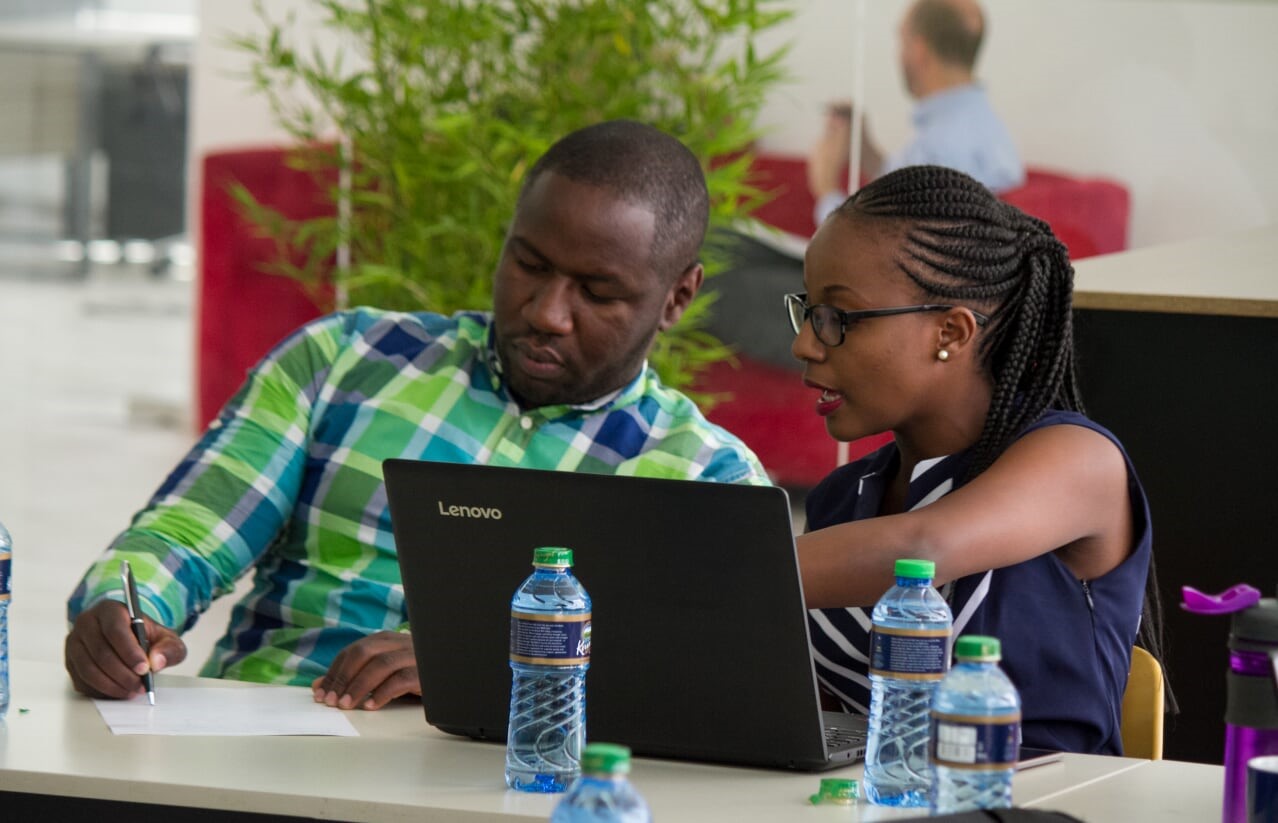
Pushing a strong startup culture in the Middle East and Africa
Did you know that the inventors of a machine that turns the air you breathe into fresh drinking water, the creators of the world’s first microchip, and the designers of an app that helps you navigate rush-hour traffic, all have one thing in common?
They all come from the same country located on the eastern shores of the Mediterranean Sea. A country that’s home to only 8.7 million people, yet has the highest number of startups per capita, and attracts more venture capital per person than any other country in the world.
While these companies were all born in Israel, they’ve all gone on to achieve global success, thanks – in part – to being cultivated by a well-supported and dynamic startup ecosystem.
Why startups matter
Startups play a significant role in driving economic growth, particularly in emerging economies. They foster a spirit of economic dynamism by spurring innovation and creating competition, resulting in more jobs, more revenue and more investment.
Having rich and fertile ground for startups to thrive is a necessity. So how can more countries across the region, and the world, develop vibrant entrepreneurial ecosystems and become global hubs of research and development?

Putting the spotlight on Research & Development (R&D)
In order to carve out a niche for themselves as epicentres of a thriving and successful startup culture, aspiring startup nations need to become trailblazers of pioneering and innovative technologies.
To do this, there must be investment in R&D capabilities. R&D is a vital component in nurturing the startup ecosystem because it plays a critical role in the innovation process by allowing scientists, researchers and engineers to develop new knowledge, techniques, and technologies.
Many of the world’s leading technology companies have R&D teams in Israel, and the country is ranked second in the world in R&D expenditure per capita, investing about 4.1 percent of its Gross Domestic Product (GDP) on R&D. The average among the OECD is 2 percent.
According to Shelly Landsmann, general manager for Microsoft Israel, “We don’t have many natural resources, which is why we have embraced technology as a primary industry. One of our brand elements as a nation is focused on innovation and Research & Development. All of this together creates a better platform for startup creation. Then add to it the support from banks, lawyers, the government – and you have the right conditions in the market to help put your innovation into action.”

Government buy-in
As Landsmann says, government support is vital to successfully nurture the startup ecosystem. In the early 1990s, the government founded the Technology Incubator Programme. Today there are over 25 incubators across the country, which offer government funding of up to 85 percent of early stage project costs for two years. These incubators nurture companies from seed to early stage, therefore mitigating the risk to the investor.
More than 1,100 projects have graduated from these incubators, with over 45 percent successfully attracting additional investments from different investors. The government initiative Yozma also nurtures the country’s venture capital sector by offering tax incentives to entrepreneurs and investors.
Governments across the region are beginning to adopt a similar model. For example, the government of Morocco has launched the Innov Invest Fund as part of its Caisse Centrale de Garantie (CCG) strategy – with financial assistance from the World Bank. The fund will support companies in seed stage, and pre-seed companies will benefit from interest-free loans in the near future.
Tunisia also passed a Startup Act in 2018. The act sets out government policies for startup growth and puts science and technology at the heart of the country’s economic transformation. The Act articulates that a startup’s operations must involve the use of new technologies, and promotes access to funding and markets. It’s viewed as a blueprint for other African policy makers.
However, according to Landsmann, while this type of government buy-in is crucial, it’s also important that businesses and governments offer tailored support for startups. “Startups are not all the same. You need to first see what stage they are at to offer the correct support for them – whether that is technology or business support – and then structure your value proposition around that,” she says.
Amrote Abdella, regional director of Microsoft 4Afrika – a business initiative on the continent that provides startups and small-to-medium-sized enterprises (SMEs) with access to software, services, funding, mentorship and technical support – agrees with Landsmann.
“Every SME goes through three phases. The first phase is the startup or struggle phase. The second is the growing phase where they begin to see profit. And the last phase is the acceleration phase, where they begin looking for partnerships to enhance their business. Microsoft 4Afrika works with an extensive partner network to offer the most appropriate support to startups during these different life-stages, whether that’s providing access to finance, technology, markets, information, skills and services,” she says.
Microsoft, for example, partnered with Popote Payments to do just that. Popote Payments is a Kenyan-based fintech startup that provides Africans with a digital alternative to the making and management of payments.
According to Samuel Wanjohi, CEO and Founder of Popote Payments, “Like many startups with a great idea and early product, we lacked the resources to get to a scalable point. Working with Microsoft enabled us to host our product on Azure through the BizSpark programme. They provided extensive training on its use, which gave us confidence in security, uptime and service levels. Microsoft also assisted us in getting market-ready through sponsoring our engagement with a leading management consultancy firm. This gave us a clear path to launch and grow the business.”
Partnering for success
It’s clear that behind many accomplished multinational companies birthed from humble startup beginnings, you’ll find a number of strategic partnerships that were key to their growth and success.

An increasing number of organisations in Africa are beginning to form partnerships and throw their weight behind tech hubs. For example, Microsoft partnered with Liquid Telecom to deliver cloud products and services to businesses of all sizes across Africa. The company also collaborated with First Bank of Nigeria to create a more enabling environment for startups and SMEs in the country.
According to the GSMA, over 50 percent of tech hubs are resorting to public or corporate partnerships. The increase in partnerships is due to an increasing acknowledgement of the mutual perks from which all parties involved can benefit. Mobile operators, for example, support over 14 percent of the active tech hubs in Africa, and Microsoft 4Afrika partners with over 12 accelerators across the continent.

From startup to scale-up
For countries wanting to grow the number of startups across the Middle East and Africa, these examples offer some guidance when it comes to creating an ecosystem that enables startup culture to survive and thrive. However, there are some who would suggest that countries should set the bar higher by aiming to be positioned as “scale-up nations”.
Building strong startups is certainly the first step, but creating businesses that can scale to be large, successful multinational companies is the real goal.
In this vein, earlier this year, Microsoft announced Microsoft for Startups, a new programme that delivers access to technology, go-to-market and community benefits that helps startups scale and grow their customer and revenue base.
Microsoft is committing $500 million over the next two years to offer joint sales engagements with startups, along with access to technology, and new community spaces that promote collaboration across local and global ecosystems.
Microsoft for Startups helps startups at every stage in ecosystems around the world:
- Microsoft Reactors are physical spaces where entrepreneurs, developers, investors and the business community can come together to interact, learn and share.
- Microsoft ScaleUp (formerly Microsoft Accelerators) is an immersive global programme that offers late-stage and series A startups who have the greatest propensity to take advantage of Microsoft’s growth programmes, such as co-marketing and co-selling opportunities, hone their infrastructure and build their businesses.
- Microsoft Ventures is Microsoft’s strategic venture capital investment team whose mission is to be an active partner at key stages of a startup’s growth.
Adopting a ‘global-first’ market approach
Across various industries, start-ups are unearthing new ways to do business throughout the Middle East and Africa. These startups are beginning to shape the way people interact in the region’s rapidly growing urban areas, while bringing numerous benefits to underserved communities. Yet the tech ecosystem remains in its early stages of development. In many markets, the start-up scene is little over five years old, and will require careful nurturing over the coming years.
Government support and strategic public-private partnerships are two vital ingredients in creating an enabling environment for startups. However, the region also needs to support business to scale in order to achieve global success. This requires a distinctive blend of society and culture, combined with strong economic and government support, as well as the adoption of a ‘global-first’ market approach.
To find out more about how Microsoft for Startups helps startups grow, build and connect – click here.










![A security team analyses key data from a visual dashboard.]](https://news.microsoft.com/wp-content/uploads/prod/sites/133/2023/04/Security-Sprint_TL_Banner-Image-519x260.jpg)



